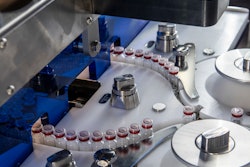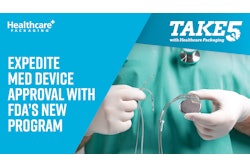This video covers:
- Pharma 4.0 allows organizations to leverage the full potential of digitalization to provide faster innovations for the benefit of patients.
- Digitization helps machine operators be more efficient and allows companies to embrace the benefits of Pharma 4.0, such as predictive technologies and artificial intelligence.
- Pharma companies must develop solutions in alignment with external partners along the supply chain by collecting data on an RPA platform.
Related to this episode:
- Data and AI Accelerate Digital Transformation in Pharma
- Read ISPE's roadmap report on Pharma 4.0
- Visit PMMI's Business Intelligence Library and download their executive summaries of their latest reports for free.
 | Read the transcript below: |
Hi, I’m Melissa Griffen, contributing editor at Healthcare Packaging, and today on our Take Five with Healthcare Packaging video I’m talking about the digital transformation happening within the pharmaceutical industry.
At the 2021 Parenteral Drug Administration Annual Meeting, multiple speakers homed in on technologies and practices which would further the industry’s transition to Pharma 4.0–many of which focused on the benefits of digital transformation. The concept of Pharma 4.0 has been gaining traction in recent years; it is the addition of cyber-physical systems to computerize manufacturing while focusing on the human element and it embeds health regulation best practices.
ISPE explains in its Pharma 4.0 initiative mission statement that accelerating the Pharma 4.0 transformation will allow organizations involved in the product lifecycle to leverage the full potential of digitalization to provide faster innovations for the benefit of patients. Digitalization is the transforming of business processes to embrace the ability of digital technology to collect data, establish trends, and allow companies to make better business decisions.
At the PDA meeting, digital technology provider Tulip Interfaces’ industry practice lead, Gilad Langer, explained that Pharma 4.0 focuses on digitization, digitalization, and the human element. Langer centered in on the digitization aspect, which is digital data collection. This is an area in which pharma is seriously behind as the majority of the industry still relies on paper systems for data collection.
Switching to a digital system would not only enable machine operators to do their jobs more efficiently, but would also allow the use of predictive technologies, augmented reality, virtual reality, Big Data, artificial intelligence, and machine learning which would increase productivity. Though, this doesn’t mean you need to implement sudden, sweeping changes. Langer said to start with smaller changes in facilities such as creating and upkeeping digital logbooks. He anticipates full digital transformation to take a number of years to accomplish.
A Strategy& insights report goes into further depth of how to apply digital transformation to facilities and supply chain, noting that digitization also provides greater visibility into supply chain operations to improve decision-making. This was echoed by CGI, an IT business consulting service firm, at the PDA meeting, explaining that digitization makes data readily available, which then allows for risk management. The Strategy& report points out that for greatest success, pharma companies must develop solutions not within their own four walls but in alignment with many external partners along the supply chain. A solution provided by CGI is Connected Quality, which is the concept of having unified, harmonized global systems and processes by ensuring the right data is collected on a Robotic Process Automation or RPA platform.
This point was also emphasized at the PDA meeting by Vasu Rangadass, CEO of L7 Informatics Inc, a software solution provider, which also offers an RPA composable unified platform with an FDA regulatory-compliant framework, called ESP.
Rangadass explained that the traditional way of collecting data by gathering it into a single database as a system of reference creates “digital silos”. These cause complications as companies merge, are acquired, and receive new products due to outdated data and lack of data sharing along the supply chain.
Of course, pharmaceutical companies are highly regulated, and there are a lot of considerations when making any system changes. There’s more on compliance, risk-based assessment, and pre-validated systems in the full story at the link here.
Thanks, and see you next time at Take 5 Video from Healthcare Packaging.






















